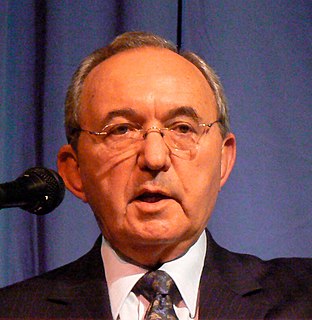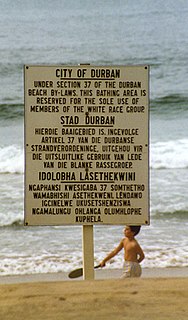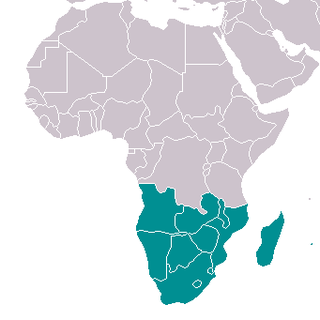
Richard Joseph Goldstone is a South African former judge. After working for 17 years as a commercial lawyer, he was appointed by the South African government to serve on the Transvaal Supreme Court from 1980 to 1989 and the Appellate Division of the Supreme Court of South Africa from 1990 to 1994.
The Sharpeville Six were six South African protesters convicted of the murder of Deputy Mayor of Sharpeville, Kuzwayo Jacob Dlamini and sentenced to death.

United Nations Security Council resolution 591, adopted unanimously on 28 November 1986, after recalling resolutions 418 (1977), 421 (1977), 473 (1980) and 558 (1984), the Council strengthened the mandatory arms embargo against apartheid South Africa imposed by Resolution 418, and made it more comprehensive. Resolution 591 sought to clarify vague terms from previous resolutions on the topic.

In United Nations Security Council Resolution 417, adopted on October 31, 1977, after reaffirming Resolution 392 (1976), the Council condemned the continuing repression against black people and other opponents of apartheid, as well as the South African media and the mounting deaths of detainees. The Council foresaw that the continuation of such activities would lead to serious racial conflict with international repercussions.

United Nations Security Council Resolution 421, adopted unanimously on December 9, 1977, after recalling Resolution 418, the Council decided to establish a committee to oversee the implementation of that resolution. It tasked the committee to report back on its observations and recommendations regarding ways in which the arms embargo could be made more effective against South Africa and to ask Member States as to how they are implementing the resolution.

United Nations Security Council resolution 525, adopted unanimously on 7 December 1982, after hearing of the death sentences on Anthony Tsotsobe, Johannes Shabangu and David Moise, the Council expressed its concern at the sentences passed by the Supreme Court of Appeal of South Africa, in addition to those of Ncimbithi Johnson Lubisi, Petrus Tsepo Mashigo and Naphtali Manana, members of the African National Congress.

United Nations Security Council resolution 527, adopted unanimously on 15 December 1982, having heard representations from Moshoeshoe II of Lesotho, the Council condemned, alongside a General Assembly resolution, an attack by South Africa on Lesotho, resulting in damage and the deaths of 40 people.
United Nations Security Council resolution 533, adopted unanimously on 7 June 1983, after reaffirming Resolution 525 (1982), the Council expressed its concern at the death sentences issued to Thelle Simon Mogoerane, Jerry Semano Mosololi and Marcus Thabo Motaung, all members of the African National Congress.

United Nations Security Council resolution 547, adopted unanimously on 13 January 1984, after reaffirming previous resolutions on the topic, the Council expressed its concern at the death sentences issued to Malesela Benjamin Maloise, a member of the African National Congress.

United Nations Security Council resolution 556, adopted on 23 October 1984, after recalling 554 (1984) and the Universal Declaration of Human Rights, the Council expressed its alarm at the killing of anti-apartheid demonstrators in South Africa, reaffirming that the country's disregard for world opinion will lead to a further escalation of the "explosive situation".

United Nations Security Council resolution 566, adopted on 19 June 1985, after recalling resolutions 269 (1969), 276 (1970), 301 (1971), 385 (1976), 431 (1978), 432 (1978), 435 (1978), 439 (1978), 532 (1983) and 539 (1983), the Council expressed concern at the tension and instability caused the continued occupation of Namibia by South Africa, noting the apartheid policies implemented in the territory and that the territory was used as a springboard for attacks on other southern African countries.

United Nations Security Council resolution 568, adopted on 26 July 1985, after expressing its outrage and concern at the suffering caused by the apartheid system in South Africa, the Council further condemned the repressive policies of the apartheid system including murders and forced removals, as well as the state of emergency imposed in 36 districts in the country, demanding it be lifted immediately.

United Nations Security Council resolution 580, adopted unanimously on 30 December 1985, having heard representations from Lesotho and recalling Resolution 527 (1982), the Council condemned the recent attacks on the Kingdom of Lesotho by South Africa, resulting in loss of life and damage to property on 19 December, in which several South African refugees were murdered in Lesotho's capital Maseru by the South African Defence Force.

United Nations Security Council resolution 581, adopted on 13 February 1986, after hearing representations from Sudan and the front-line states and reaffirming resolutions 567 (1985), 568 (1985), 571 (1985), 572 (1985) and 580 (1985), the Council strongly condemned "racist South Africa" for its recent threats to perpetrate acts of aggression against neighbouring countries in southern Africa.

United Nations Security Council resolution 610, adopted unanimously on 16 March 1988, after reaffirming resolutions 503 (1982), 525 (1982), 533 (1983) and 547 (1984) expressing concern at the imposed death sentences of anti-apartheid activists, the Council noted the deteriorating situation in South Africa. Resolution 610 concerned the Sharpeville Six, accused of the murder of the Deputy Mayor of Sharpeville on 12 December 1985.

In United Nations Security Council resolution 615, adopted unanimously on 17 June 1988, after reaffirming resolutions 503 (1982), 525 (1982), 533 (1983), 547 (1984) and 610 (1988) expressing concern at the imposed death sentences of anti-apartheid activists, the Council noted the deteriorating situation in South Africa.

United Nations Security Council resolution 623, adopted on 23 November 1988, the Council noted with grave concern the death sentence imposed upon anti-apartheid activist Paul Tefo Setlaba, on the basis of "common purpose" in South Africa. The resolution at the meeting urgently called by Zambia strongly urged the Government of South Africa to commute Setlaba's sentence and stay his execution in order to further avoid aggravating the situation in South Africa.

United Nations Security Council resolution 930, adopted unanimously on 27 June 1994, after recalling resolutions 772 (1992) and 894 (1994), the Council noted with satisfaction that a democratic and non-racial government had been established in South Africa, and terminated the United Nations Observer Mission in South Africa (UNOMSA).
Chris Hani, General-Secretary of the South African Communist Party (SACP), was assassinated by anti-communist extremist Janusz Waluś on 10 April 1993. The assassination, later tied to members within the Conservative Party, occurred outside Hani's home in Dawn Park during a peak period of progressive anti-apartheid momentum in South Africa. After the assassination, racially fuelled riots drew international attention to the instability of the political division within South Africa, leading to an inclusive national democratic election in April 1994, won by the African National Congress (ANC). Assassin Janusz Waluś and accomplice Clive Derby-Lewis were sentenced to death after their arrest in 1993, however this sentencing was later commuted to life imprisonment.
Capital punishment in Malawi is a legal punishment for certain crimes. The country abolished the death penalty by a Malawian Supreme Court ruling in 2021, but it was soon reinstated. However, the country is currently under a death penalty moratorium, which has been in place since the latest execution in 1992.









